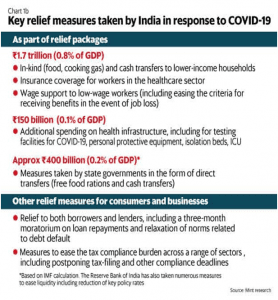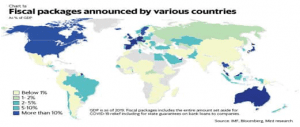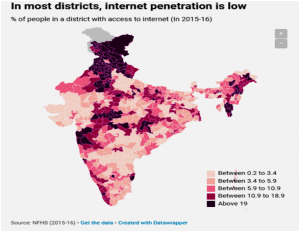THE CONTEXT: In order to deal with the Covid-19 pandemic, governments across the world have imposed measures like lockdown and social distancing. However, these measures have caused collateral damage to almost every sector of the economy, so much so that the IMF held the current economic crisis could be the worst ever since the Great depression 1929. There is a need for the preservation of the socio-economic system during the Great Lockdown. The government of India can think of implementing Emergency Basic Income (EBI). EBI is a kind of Universal Basic Income provided during a crisis like the Covid-19, but subject to a rollback when normalcy returns.
THE PRESENT ECONOMIC CRISIS DUE TO COVID-19
The present situation poses a unique economic challenge. Unlike a normal slump, when policies can be tailored to finance and raise demand, here, the challenge is of keeping productive capacity intact, even as many firms and workers remain idle.The global economic system that has taken shape over the past four decades is much more fragile than in 1918. What further distinguishes the current crisis from earlier ones, including the 2008 financial crisis is that this one is not just economic but also a social one, instantly affecting the lives of everyone in more ways than one. Millions are going to lose their incomes and will not be able to get daily necessities for survival.
According to Nobel Prize-winning economist Paul Krugman called the present situation “coronacoma”, means it the economic equivalent of a medically induced coma, “in which some brain functions are deliberately shut down to give the patient time to heal.”
As Krugman argued, the economic response to the crisis will have to include two parts:
- An immediate disaster relief component- that ensures the survival of both firms and workers who have been rendered idle.
- A stimulus component – that aims to repair and restart production lines during the exit phase of the lockdown.
For a country like India, with a large informal sector and a weak social safety net, the immediate disaster relief component is going to be much tougher than the stimulus component.India’s informal economy has about 50 crore working persons and would be among the most affected by the COVID-19 related shutdowns.
THE RELIEF MEASURES BY INDIA
The Union and state governments have announced some relief measures, they appear to be grossly inadequate to meet the challenge. Compared to most other countries, India’s relief-cum-stimulus measures so far appear puny.

India’s measures are very lower than the fiscal packages announced by various countries.

- The US announced a $2.2 trillion stimulus on a $20 trillion GDP base.
- Malaysia, whose per capita income is four times that of India, has announced a package that is 16 times bigger.
- Even poorer neighbour Pakistan has a much larger covid-19 response package (as share of its GDP) compared to India.
- Thailand, whose per capita income (PPP) is a little more than two times that of India, has announced a package that is 10 times bigger (as a share of GDP) than India.
EBI IS NEED OF THE HOUR
Due to the present lockdown, millions may lose their incomes and face difficulty in receiving things of daily necessities for survival, resulting in social unrest. The Emergency Basic Income (EBI) could solve this unrest.
The Emergency Basic Income (EBI) is a kind of
What is Universal Basic Income?
- The Economic Survey of India 2016-17 has advocated the concept of Universal Basic Income (UBI) as an alternative to the various social welfare schemes in an effort to reduce poverty.
- Idea behind the Universal Basic Income is that every person should have a right to a basic income to cover his needs, just by virtue of being a citizen.
The components of UBI

UBI has three components
- Universality- It is universal in nature.
- Unconditionality- There are no preconditions attached with the cash transferred to the beneficiary.
- Agency – Respecting the poor persons’ decision making ability and not having a paternalistic attitude towards them.
Universal Basic Income(UBI) provided during a crisis like the Covid-19, but subject to a rollback when normalcy returns.
- The EBI provided through the direct cash transfer mechanism will not only arrest potential social unrest but also ensure that there is continued aggregate demand to sustain the economy.
Some of the states have announced the enhancement of rations under the Food Security Act.
- While providing additional foodgrains is useful, with broken supply chains and crumbling logistics, it may have its own challenges.
- Also, the circumstances, risk and shocks in which people are trapped in lockdown are varied. The EBI allows that individual to decide how such risks should be mitigated and how priorities are to be set.
- Thus, EBI will complement the steps (providing essential goods through PDS) taken by the government.
The lockdown has dragged many people into the poverty trap. Thus, EBI may simply be the fastest way of reducing poverty induced by the lockdown.
Existing welfare schemes are riddled with misallocation, leakages and exclusion of the poor. However, the trinity of Jan-Dhan, Aadhaar and Mobile (JAM) can enable proper implementation of EBI and can reduce inclusion and exclusion issues to a larger extent.
CHALLENGES
- Although most people have a unique ID by now (Aadhaar), the most vulnerable section of society doesn’t have Aadhar and a functional bank account or access to mobile or internet (for e-transfers).
- The latest district-wise data on these parameters come from the National Family Health Survey for 2015-16. It showed that despite gains in access to bank accounts and mobile phones, there were still significant disparities across districts. Internet access was limited across most districts.

- The Union Government has sought to provide Rs 500 per month to women in a household (during the lockdown). However, the amount is quite low to call it a significant income support.
- Already Indian government has been facing a financial crunch with respect to social sector schemes. Thus, providing an EBI may add to the fiscal burden of the government.
WAY FORWARD
The EBI programme with a fixed and transparent clause can inspire the confidence of both ordinary citizens and help resolve the trade-off between lives and livelihoods. EBI must also include an in-kind transfer component. The ratio of cash to in-kind transfers is something that is best left for states to decide. The Union Government can channelize the savings from the global crude oil price fall to fund EBI, without compromising macroeconomic fundamentals. There is need for a functional JAM (Jan Dhan, Aadhar and Mobile) system, as it will ensure that the cash transfer directly into the account of a beneficiary.
CONCLUSION: In the outbreak of COVID-19, several countries are considering massive fiscal stimulus packages to blunt the concurrent crises of the pandemic and the unravelling economic depression. In such situation, Emergency basic income will not only arrest potential social unrest but also ensure that there is continued aggregate demand to sustain our economy. Like other countries, India too could explore unconventional options, such as a special purpose vehicle, to fund this programme as long as the Great Lockdown lasts.
Spread the Word



